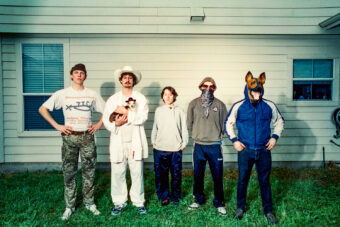Release Date: December 04, 2015
Label: Southern Lord
From the Seattle birth of drone-metal duo Sunn O))), they’ve always imbued their creaking compositions with a sense of reverent, primordial purpose — as if on the fourth day, when God created the Earth’s two attendant heavenly bodies and all the stars that surround them, he might have severely f**ked up. Somewhere deep in the freshly expanding universe, where there should have been the spectral gleam of a newly minted gas giant was by chance mistake a yawning void — and ever since they’ve been fighting their way back to the world of light.
Such mythos would be over the top for most other acts, but the music that Greg Anderson and Stephen O‘Malley have made under the Sunn banner is too ancient, too incantatory, too wonderfully foreign to be greeted on the worldly terms that we offer other guitar-based bands. The relatively brief new LP Kannon — which at 33 minutes clocks in at half the length of their last non-collaborative work — is a triumph of economy. It feels as world-shaking as ever, but they’re able to do so through means less grandiose than ever before.
In a lot of ways, it’s a return to the band’s earliest days when, inspired by drone-metal originators Earth, they distilled doom to its most elemental parts: feedback like a frigid sea-breeze, power chords as dense and unmoving as the oceans deep, percussive rolls like wave-eroded seaside cliffs. Those component pieces, along with the glittering gravel of Mayhem vocalist Attila Csihar’s quasi-religious chants, make up the entirety of Kannon‘s three brief works. But what keeps this record from feeling like a retread is the new knack they have for making the sparse parts feel like more.
An instrumental guitar passage like the one that underpins “Kannon 2” might feel limpid in other hands, but these hooded mystics imbue each tectonic shift with inimitable importance. The high wire tension created by each interminably sustained note is the narrative force behind most doom metal, but each chord change on Kannon reasserts the duo’s status as magicians — a gentle plink on a ride cymbal can feel like an eternity and ten minutes of feedback can feel like an instant. These compositions reject music as a time-based medium, teasing and testing patience to the point that temporal markers almost cease to matter — the gloom that swallows you feels unending and meditative, should you choose to give yourself over to it.





